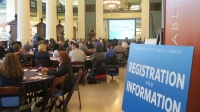Bridging Kansas City's Digital Divide
Kansas City Public Library, Mo.
Innovation Synopsis
Challenge/Opportunity
A Google study four years ago found that 17 percent of Kansas City’s residents – almost one in five – were not using the internet. Of that number, 28 percent lacked access and 41 percent thought it was irrelevant. Close to half were African Americans and nearly that many were 65 or older. Separate data has indicated that 70 percent of all students in Kansas City's public schools don’t have internet access at home.
Key Elements of Innovation
The Library has staged three digital inclusion summits in the past 21 months, drawing more than 500 participants. Hotspots for Learning, a pilot program with Kansas City schools, allows students to "check out" mobile hotspots, giving them internet access from home and other remote locations during the school year. The Library has further expanded internet access for students by allowing them to use school IDs as library account numbers, providing remote access to the Library’s e-resources. The Library is part of three White House-backed federal initiatives, ConnectED, ConnectHOME and ConnectALL, designed to extend broadband access to areas of greatest need.
Achieved Outcomes
Every KC public school student now has automatic access to Library services and resources. We are working on charter schools. We are pushing the KC Chamber of Commerce to make digital inclusion a “Big Five” initiative. The Library’s digital literacy efforts led to its selection in April 2016 for a Google Fiber-sponsored fellowship program and the Community Leaders program, designed to create programming and sustainability for digital literacy classes inside and outside the Library. Through the Community Connectivity Initiative, we are part of a select group helping to build an assessment tool for use by other communities in broadband adoption.

